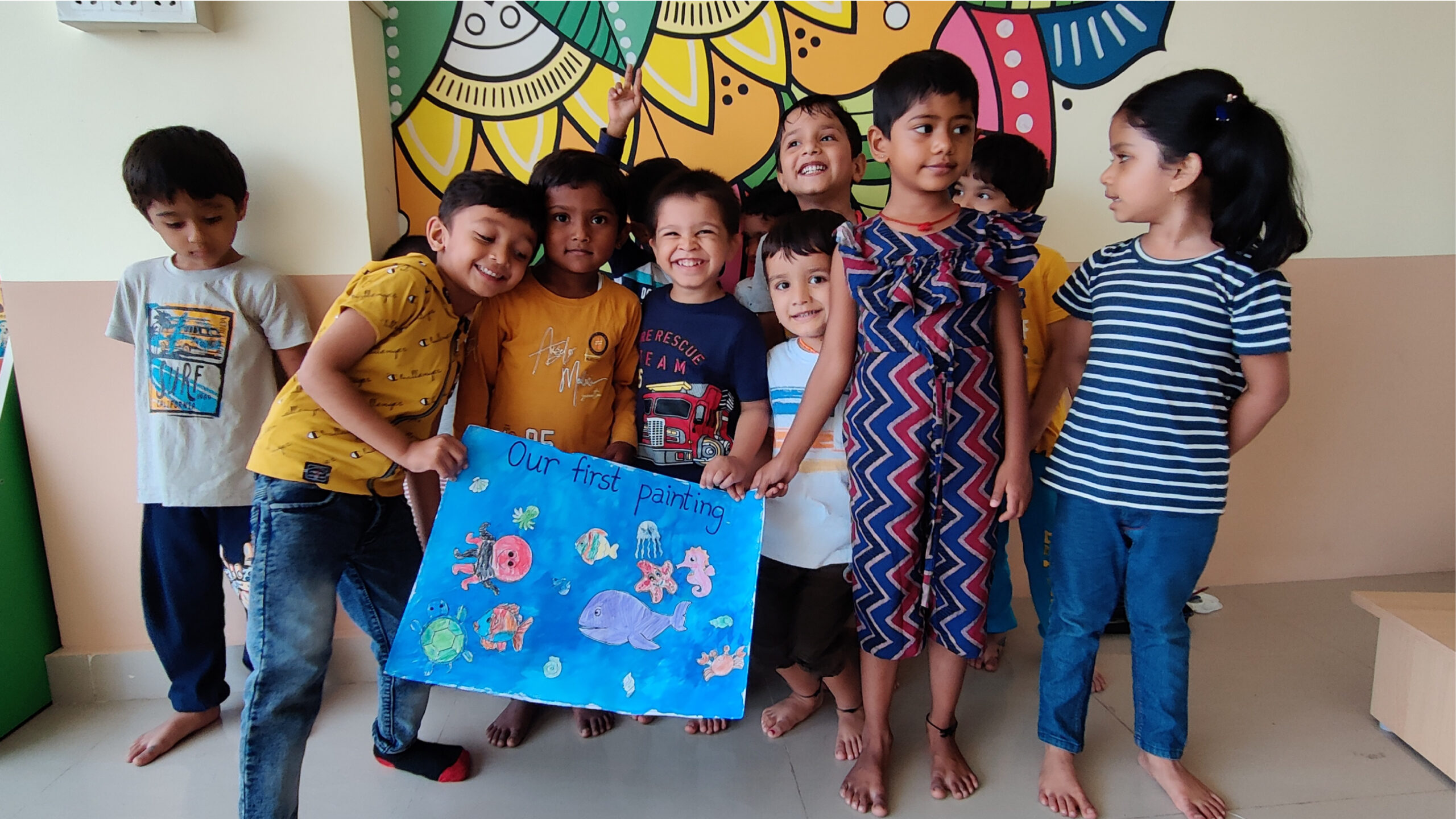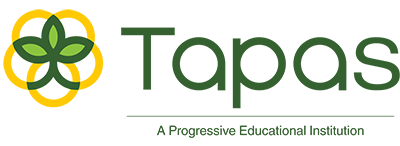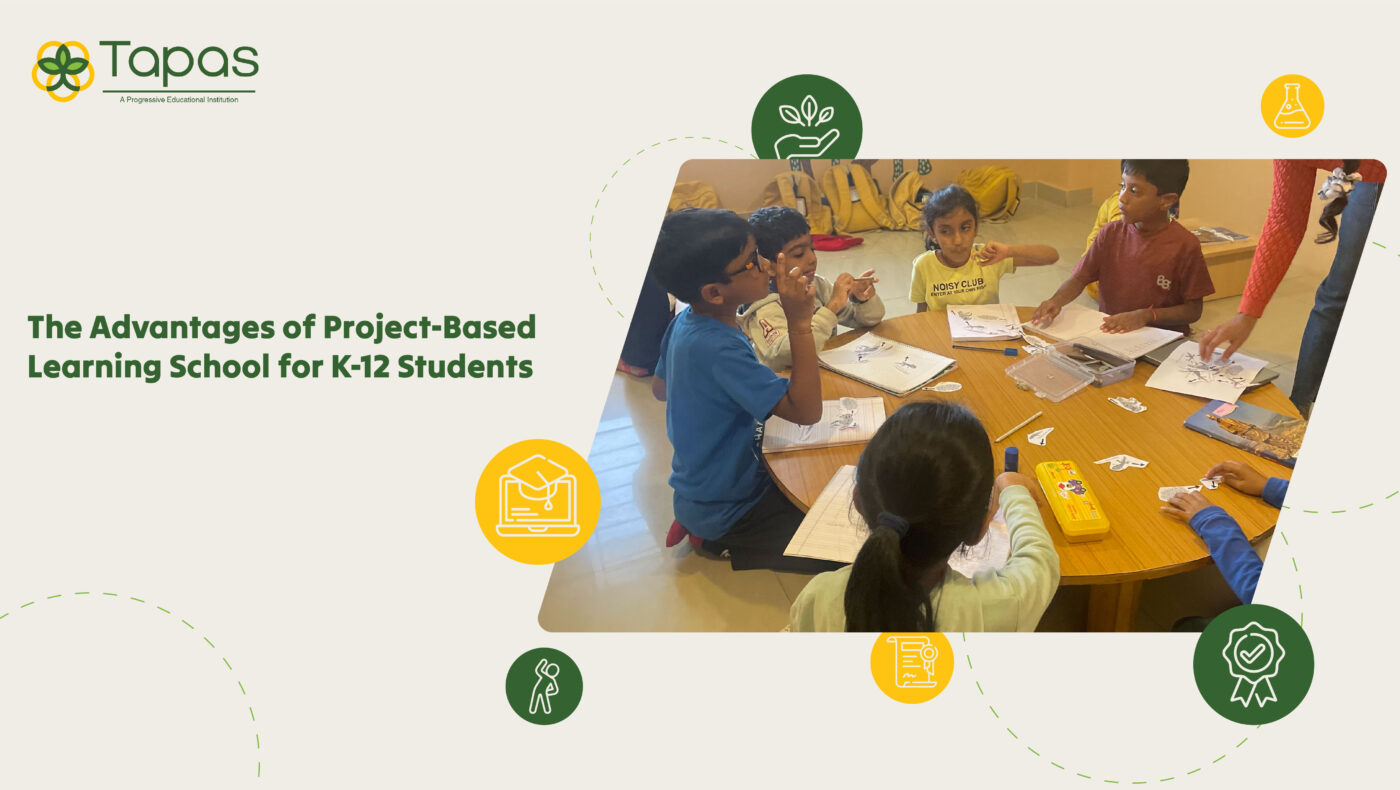Project-Based Learning (PBL) schools are transforming K-12 education, offering a dynamic approach that engages students, fosters critical thinking, and prepares them for the challenges of the future. At Tapas Education, we recognize the immense benefits of PBL in cultivating well-rounded individuals. In these innovative schools, students don’t merely memorize facts; they actively apply knowledge to real-world problems, nurturing creativity, teamwork, and a passion for learning. Join us on a journey to explore the many advantages of Project-Based Learning schools, where education transcends textbooks and empowers students to become lifelong learners and adaptable problem-solvers.
Hands-On Learning
Project-Based Learning (PBL) encourages active learning by immersing students in hands-on projects that relate directly to their coursework. This approach enhances understanding by allowing students to apply what they learn in practical, real-world scenarios. It goes beyond rote memorization, fostering a deeper comprehension of concepts and their practical applications. PBL empowers students to explore, question, and create, ultimately equipping them with a holistic understanding of the subject matter and the skills needed to navigate complex challenges.
Critical Thinking
Project-Based Learning (PBL) equips students with invaluable problem-solving skills as they delve into real-world issues. By engaging in practical projects, students learn to identify challenges, develop strategies, and collaborate effectively. This hands-on approach prepares them for future challenges, nurturing their ability to think critically and creatively. PBL instills a sense of resilience and adaptability, ensuring that students are well-prepared to face the complex issues they will encounter in their academic and professional journeys. These problem-solving skills are a cornerstone of their future success.
Creativity and Innovation
- Encourages out-of-the-box thinking.
- Provides a platform for creative expression.
- Sparks curiosity and exploration.
- Nurtures innovation and originality.
- Challenges students to find unique solutions.
Collaboration
Project-Based Learning (PBL) encourages students to collaborate in teams, fostering crucial teamwork and interpersonal skills. Through group projects, students learn to communicate effectively, delegate responsibilities, and appreciate diverse viewpoints. These skills extend beyond the classroom, preparing students for success in the professional world, where teamwork is often essential. Moreover, PBL creates an environment where students learn from each other, building relationships and enhancing their interpersonal skills. These abilities are invaluable, not only for academic achievement but also for personal growth and future career prospects, making PBL an ideal educational approach for K-12 students.
In-Depth Understanding
Project-Based Learning (PBL) offers students a unique opportunity to dive deep into subjects by immersing themselves in real-world projects related to the curriculum. This hands-on approach enables students to connect theoretical knowledge to practical applications, leading to a deeper and more meaningful comprehension of the subject matter. Rather than memorizing facts, students engage in active exploration, problem-solving, and critical thinking. This not only enhances their understanding of the material but also equips them with skills and knowledge they can apply in future academic pursuits and real-life scenarios. PBL enriches the learning experience by making education relevant, engaging, and enduring for K-12 students.
Real-World Relevance
Project-Based Learning (PBL) aligns education with real-world issues, injecting practicality and relevance into the learning process. By tackling projects connected to genuine societal challenges, students gain a profound understanding of the issues at hand and discover how their knowledge can be a force for positive change. This approach transforms education from an abstract concept into a tool for addressing contemporary problems, preparing K-12 students to be active, informed, and engaged citizens who can contribute meaningfully to their communities and the world. PBL bridges the gap between the classroom and reality, fostering a sense of purpose in education.
Motivation
- PBL projects are inherently hands-on and interactive, grabbing students’ attention.
- Real-world applications of knowledge make learning meaningful and exciting.
- Students are more likely to be self-motivated when working on projects they find interesting.
- PBL encourages curiosity and exploration, further fueling students’ desire to learn.
- The tangible outcomes of PBL projects provide a sense of achievement, boosting motivation.
Preparation for Future Careers

Project-based learning equips students with essential soft skills such as communication, critical thinking, and problem-solving. These competencies are not only valuable in the classroom but also highly sought after in the job market. By actively engaging in hands-on projects and collaborating with peers, students refine their abilities to communicate effectively, analyze complex issues, and find innovative solutions. This skill set prepares them not only for academic success but also for future career opportunities where adaptability and creativity are highly prized. PBL empowers students to become well-rounded individuals ready to tackle the challenges of the professional world.
Ownership of Learning
In a Project-Based Learning (PBL) environment, students are active participants and drivers of their own education. This responsibility fosters a sense of ownership and self-discipline. They are no longer passive learners but take charge of their projects, deadlines, and learning objectives. This autonomy not only prepares them for the responsibilities of adulthood but also instills a profound sense of ownership in their educational journey. As students engage with real-world problems and navigate project complexities, they develop essential life skills like time management and self-motivation, laying a strong foundation for their future endeavors.
Assessment
Project-Based Learning (PBL) offers a more comprehensive assessment of students’ capabilities compared to traditional testing methods. While tests focus primarily on academic knowledge and memorization, PBL evaluates a broader range of skills and competencies. Through hands-on projects, students demonstrate problem-solving abilities, critical thinking, creativity, teamwork, communication skills, and practical application of knowledge. This multifaceted assessment approach provides a more accurate reflection of their readiness for the real world, where these skills are highly valued. It shifts the emphasis from rote memorization to practical, applicable skills that students can carry into their future careers and endeavors.
Adaptability
Project-based learning (PBL) equips students with the adaptability needed in a rapidly changing world. By engaging in real-world projects, students learn to navigate uncharted territories, tackle unfamiliar challenges, and adapt to evolving circumstances. This dynamic approach fosters resilience and an openness to change, crucial attributes for success in a world where innovation and adaptability are paramount. PBL empowers students to embrace new situations confidently, equipping them with the skills and mindset to thrive in a constantly evolving global landscape.
Life Skills
Project-Based Learning (PBL) seamlessly integrates essential life skills into the learning process. Students develop time management abilities as they plan and execute complex projects, ensuring tasks are completed efficiently. They gain organizational skills by structuring their projects and materials effectively. Additionally, PBL encourages public speaking and presentation skills, as students often showcase their work to peers and instructors. These life skills complement academic learning, preparing students not only for academic success but also for the challenges and opportunities they’ll encounter in their future endeavors.
Global Perspective
Here are some examples of global issues that projects in a Project-Based Learning (PBL) school can explore, along with brief project descriptions:
| GLOBAL ISSUE | PROJECT DESCRIPTION |
| Climate Change | Design a climate awareness campaign for the community. |
| Food Security | Create sustainable urban gardens to address food scarcity. |
| Clean Water Access | Develop water filtration systems for communities in need. |
| Poverty Alleviation | Create micro business plans to support local artisans. |
| Gender Equality | Organize workshops promoting gender equality awareness. |
| Sustainable Energy Resources | Design and build solar-powered devices for rural areas. |
| Refugee Crisis | Create resources to support refugees in integrating into the local community. |
| Cultural Exchange | Facilitate cultural exchange programs with students from different countries. |
These projects allow students to gain a broader perspective and understand the interconnectedness of global issues while developing essential skills.
These advantages highlight the positive impact of PBL schools on K-12 students, enriching their educational experience and preparing them for future success.
Conclusion
In a Project-Based Learning (PBL) school, students are not just learners; they are creators, problem solvers, and active participants in their education. The advantages are clear: critical thinking, collaboration, practical skills, and a deeper understanding of the world. So why wait? Explore the transformative power of PBL education at Tapas Education, and empower your child to become a confident, capable, and compassionate global citizen. Join us on this journey of discovery and growth. Your child’s future awaits!

